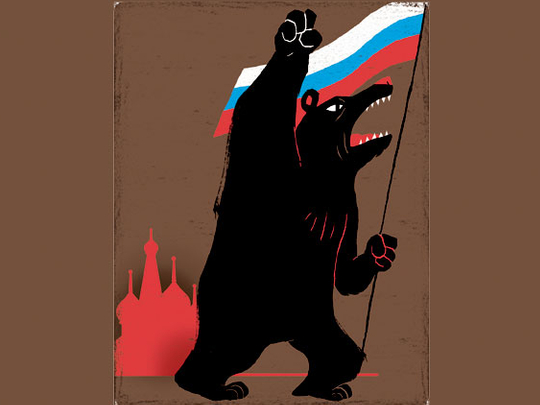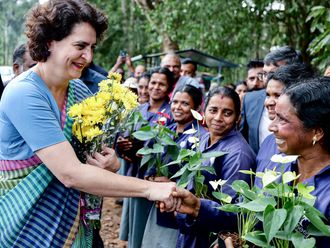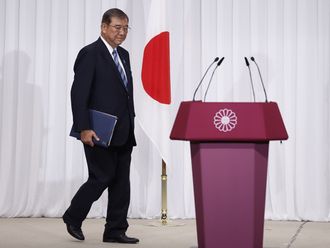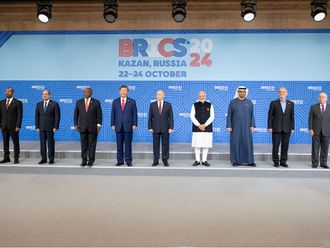
Indignation over voter fraud. Calls for free and fair elections. Angry demonstrators testing their mettle against an arrogant regime. Like last year's Arab Spring, this winter's mass protests in Russia exhibit several hallmarks of people-powered democratic revolts. But to see the rallies over rigged legislative elections in December as primarily a political wave is to miss a more fundamental leaven at work in Russian society: a moral awakening akin to the American civil rights movement.
I know because last summer I spent weeks talking with a variety of leaders in Russian society — well before the winter of electoral discontent. Some are fighting corruption. Others are working to save historical buildings from demolition, or stop pollution.
What they all shared with me was a profound sense that lasting liberalisation of their homeland would come about only through the realisation of a mature, self-aware civil society able and willing to control the executive branch.
The seeds of this evolution, these leaders agreed, will sprout only if the Russian people forsake their fear and indifference and embrace courage and will. An early test was to come yesterday, the date of a planned massive protest in Moscow. One month later is the presidential election itself. A victory by Prime Minister Vladimir Putin and his United Russia party was once seen as inevitable. Putin still may well win and resume the presidency, but Russians are beginning to see that they have a choice. Acquiescence to authoritarian rule is not in their DNA.
The dissent I witnessed last summer emerged not so much from political as moral rationale. Indeed, the six activists I interviewed shared a strong commitment to keeping their work non-political — but they still found themselves forced to grapple with the regime.
Take Evgenia Chirikova. She leads ECMO, a group that works to protect Moscow's Khimki Forest of birch trees from reckless highway construction. "I have no intentions of going into politics," she told another interviewer last year. "It is the regime functionaries that make me into an opposition leader." Chirikova is now one of the political protest movement's most visible leaders. Consider the evolution of what should have been the least "political" organisation in my sample: the Federation of Automobile Owners of Russia (FAR).
FAR has been exposing the official corruption that grows out of the "transportation tax" that's levied on every car in Russia. But along with the group's demands for "public control over everything that is connected to the formation of monopolistic prices, state regulation, and duties," FAR links its mission to the deeper effort to make government accountable to the people. "It is not just the price of gasoline that will depend on how we act," reads a post on FAR's website, "but to what extent the authorities will take into consideration our interests in the future." To that end, FAR has worked hard to galvanise public support behind repealing flagrantly unequal — not to mention lethal — double standards in traffic regulations. Government officials of all kinds, both federal and local, are permitted to drive with blue flashing lights and violate the rules, including driving on the wrong side of the road. In a letter to Putin, FAR demanded his resignation if he is unable to meet its demands.
"Where does the regime's impunity come from?" asked Maxim Vedenev, a regional leader of the human- and economic-rights watchdog group TIGR. "It is a function of our indifference. Indifference breeds impunity, and impunity destroys everything. If people respected themselves more, we would have never had such impunity." The struggle to foster a self-respecting citizenry, says Chirikova, could last a lifetime. She and others were confident that only a giant shift in people's attitudes — and, through it, of the country's political culture — would create a democratic and prosperous Russia. "The change of political regime is possible only through the change in people's mentality," said one activist. "The key is not to be afraid," another leader told me.
Equality before the law
"Many [like-minded people] gathered in one place can change a great deal," added another respondent. "If people begin to self-organise, we won't need any revolutions. This will be the most peaceful revolution of all: People will simply stop submitting and begin to demand." It is clear that we are present at the birth of something new in Russian political tradition, at least since its evolution was interrupted by the 1917 Bolshevik Revolution. No historical parallel is perfect, but it is hard not to hear echoes of the civil rights movement in the United States.
Like its US counterpart more than half a century ago, these grass-roots movements' ultimate goal is dignity and equality before the law. And just like the leaders of the civil rights movement, Russia's activists seek to effect vast political and social change by personal and deeply moral effort fuelled from within. Both reject violence in principle. Both establish no time limits to the achievement of their goals, displaying quiet but unyielding determination and patience to persevere as long as necessary.
Coinciding with the cracks in the icy carapace of autocratic and corrupt Putinism, the citizenship ethos spread by these and other grass-roots movements throughout Russia could provide the moral foundation for Russia's second breakthrough into democratic modernity in the past 20 years.
— Christian Science Monitor
Leon Aron is resident scholar and director of Russian studies at the American Enterprise Institute. His book, Roads to the Temple: Truth, Memory, Ideas, and Ideals in the Making of the Russian Revolution, 1987-1991, will be published by Yale University Press in June.








